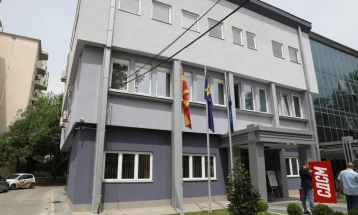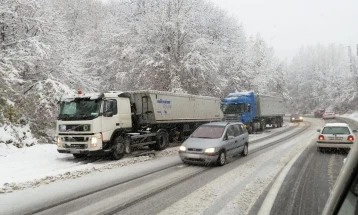PINA: Over 81% of 103 surveyed women journalists have faced online harassment

Skopje, 7 October 2022 (MIA) – As many as 81.6% of 103 women journalists surveyed in North Macedonia have faced online harassment, show results of a survey conducted by the Platform for Investigative Journalism and Analysis - PINA with the support of the OSCE Mission to Skopje.
The survey questionnaire is part of an in-depth analysis on online harassment of women journalists conducted in the country by PINA.
In addition to analysis of local and international reports, legal analyses, research and publications, interviews have also been conducted with relevant stakeholders both from the field of journalism and from the field of gender-based violence, and a survey was also conducted with 103 women journalists, of whom 80.6% have more than 10 years of work experience.
According to the women journalists, the motive for the harassment was most often due to publication of articles aimed at centers of power (56.6%), in 43.4% of cases due to publication of articles about social developments that were critical of the authorities, in 36.1% due to published articles about social events that were critical of a party. A smaller number of women journalists said they were harassed as a result of expressing personal views and opinions about social events that were critical of the authorities (24.1%) and of a party (18.1%).
According to data from a survey by the International Federation of Journalists (IFJ) cited in the PINA publication, 64% of women journalists have faced online violence, of which almost half (47%) have not reported the case. The results of the questionnaire show that this number is even higher in the country - as many as 81.6% of women journalists in the country faced online harassment because of their work, and almost half (43.7%) did not report the harassment anywhere, while the largest part of the rest (32%) reported it to their editorial office.
Over 29.7% of women journalists said their photos were shared in certain groups on social networks, with the aim of discrediting them. 22% of women journalists faced online stalking, while orchestrated campaigns were organized against 18.7%.
Although the majority (86.4%) of respondents confirmed that they have been informed where to report a case of online harassment, only 25.2% turned to a competent institution. Almost half (41.9%) of the women journalists who reported online harassment and attacks were very dissatisfied from the cooperation with the institutions, and only two respondents said they were satisfied.
The survey shows that most often (79.3%) women journalists said they didn’t know the harasser, and as many as 89.9% of respondents were harassed on the social network Facebook. In the conclusions of the analysis, one of the stated problematic aspects is the failure of the Facebook platform to report online harassment.
In 74.3% of the cases, the harassment experienced didn’t cause changes in further behavior and some respondents ignore such content, accepting it as part of the profession, which shows a high degree of normalization of online harassment.
As the author of the analysis, Bojana Jovanovska, pointed out at the recently held Media Festival Skopje, the aim of the attacks in the digital space is to silence the voices of those attacked, and indirectly to silence and discourage like-minded people, as well as target groups that share identity characteristics with the primary victims of harassment. That’s why the analysis is dedicated to women journalists, who are affected because of their public work as media workers, but also as women in a patriarchal society.
According to the content of the online harassment faced, hate speech dominates with 69%, followed by sexism (51.7%) and chauvinism (43.7%). Attacks in the digital space also turn into threats of physical violence (24.1%) and threats to life (19.5%). The fact that as many as 36% of respondents believe that they have faced organized attacks is also worrying.
PINA’s first publication “From normalisation to self-censorship – Analyses of the online harassment of women journalists in North Macedonia” was recently promoted at the Media Festival Skopje, alongside PINA’s short documentary “Dangerous Network” which focuses on the experience of several women journalists who were the target of various types of online harassment.
Through the preparation of this analysis, as part of the project on Promoting the safety of women journalists and professional standards in the media, supported by the OSCE Mission to Skopje, the PINA platform, as an organization that has been working since its establishment to change the awareness of the position of women journalists in the Macedonian society, gives its contribution in an attempt to highlight this topic.
The analysis, PINA said in a press release, was made in order to provide an insight into the current situation with online harassment and attacks on women journalists as a form of gender-based violence, as well as to identify possible solutions to reduce and overcome the issue, including mechanisms and resources to provide adequate protection and help.







